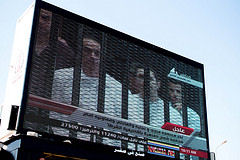How the ICC can help Kenya
The ongoing International Criminal Court trial into the so-called “Ocampo Six” is a reminder of how raw the violence around the 2007 Kenyan election remains. It now seems likely that the verdicts on the six won’t be announced until next year – until which time Uhuru Kenyatta, one of those accused of inciting ethnic violence, remains in the post of Deputy Prime Minister. Over 1100 were killed, and had the coalition agreement not come when it did, the spectre of fully-blown Civil War was a genuine possibility. The international community was in shock, having traditionally viewed Kenya as one of the least violent countries in Africa. Really, they shouldn’t have been. A brief history lesson into how Daniel Arap Moi …
One small step for a Chinese, one big step for China. Is the space race really a sign of China’s new confidence?
When westerners think about China, the concept that springs more and more to mind is modernity. This seems surprising when one looks at the statistics – after all, the developing middle class, an indicator of a more urban and modernizing society, is still a minority (perhaps 300 million of China’s 1.3 billion population), albeit a fast-growing one, and China remains a very poor country in terms of per capita GDP, as well as substantially rural. Yet in other areas, it’s clear that China is placing itself at the forefront of our understanding of what it means to be a modern state. One iconic area in this regard is space technology: the Chinese Shenzhou programme of space exploration seems particularly daring …

The Myth of ‘Sixty Years of Oppression’
Reem Abou-El-Fadl has recently published an article in Al-Akhbar English newspaper entitled ‘From Nasser to Tantawi: The Myth of “Sixty Years of Oppression”‘. The article considers the connections that have been made in Egypt between the July 1952 Revolution, launched by the Free Officers movement, and the January 2011 Revolution, launched by this year’s popular uprising in Egypt. The article acknowledges that military officials first came into government after the July Revolution, but it goes on to explore the deceptive myth of ‘sixty years of oppression’ since, which has been heard often in recent months. ‘Yet today’s generals are protecting an entirely different set of interests from those important to the Free Officers. They have presided over months of delay …
Yemen’s Winter of Discontent
As the Arab Spring continues to reverberate through the countries of the Islamic Middle East, attention has now turned to the impoverished Arabian Peninsula state of Yemen. There the popular rising against President Ali Abdallah Saleh’s regime that began last February, inspired by events in Tunisia and Egypt, is now rapidly descending into a bloody civil war. In a country where every second person owns a gun, the escalation of violence has been gradual but deadly. Hundreds have been killed during September in heavy fighting on the streets of the capital Sana’a, as forces loyal to the government have sought to violently suppress street protests. In response, army units that have defected are protecting the protestors. As these well-armed military formations …
Visibility, seeing and displacement: on the work of the photographer Miki Kratsman
On the 31 July 2011, photographer Miki Kratsman, head of the photography department of the Bezalel Academy of Art and Design, learnt that he was the recipient of the EMET Prize for Art, Science and Culture awarded by the Prime Minister of Israel. Kratsman expressed his surprise (http://www.haaretz.co.il/hasite/spages/1239559.html): “when a minister like Liebermann is in office, and people understand his logic and do not go out to the streets and protest against the horrible things he does, I am awarded with a prize”. There is, indeed, a sharp opposition between the brutality and ruthlessness of the current Israeli government, Kratsmans’ bold interventions into the seemingly stable status quo, and the decision to award him a with prize. In a long …

Trying Mubarak
I have recently published an article entitled ‘Trying Mubarak’, discussing what has been called ‘the trial of the century’ in Egypt. I argue that the trial of former Egyptian President Hosni Mubarak, which began on 3 August 2011, represents a barometer of the fortunes of the January Revolution as a whole. A common challenge confronts both the achievement of accountability in the trial, and the fulfilment of the Revolution’s demands, namely the role of the ruling Supreme Council of the Armed Forces (SCAF). This article discusses the achievement which the holding of this trial represents in the context of the revolution, as well as the practical challenges faced by the legal team of the victims’ families. It then considers the …
The Fight for Libya’s Oil
While the remaining forces loyal to Muammar Gaddafi still hold out against the rebel militia and its NATO allies in the coastal town of Sirte, the fight for Libya’s oil has already begun. Europe’s oil companies are hovering like a flock of carrion birds over the carcass of Gaddafi’s regime. The pickings to be had are significant. Libya accounts for 2% of global oil production, but the development of new fields could see that figure double in the next decade. Proven reserves of 46.4 billion barrels are confirmed, but vast tracts of the Libyan deserts remain unexplored. Europe’s oil giants Eni, Total, BP and Repsol YPF are perfectly positioned to take advantage of these commercial opportunities. Gas production, too, has …
Gender Matters in Selection of Female Party Candidates in Canada
Christine Cheng has recently co-published an article with Margit Tavits in Political Research Quarterly arguing that female party presidents in Canada are more likely to nominate female party candidates. The research is based on original data from Canada’s 2004 and 2006 federal elections. When the party’s gatekeeper or president is female, the candidate is also six percent more likely to be a woman. The effect is small, but statistically significant, making it important to consider in policies aimed at increasing female representation in politics. Namely, beyond parties’ formal rules to encourage female participation, informal interactions matter. Having more women in top political posts can be just as effective for attracting women to politics as formal party regulations. Another important finding …









